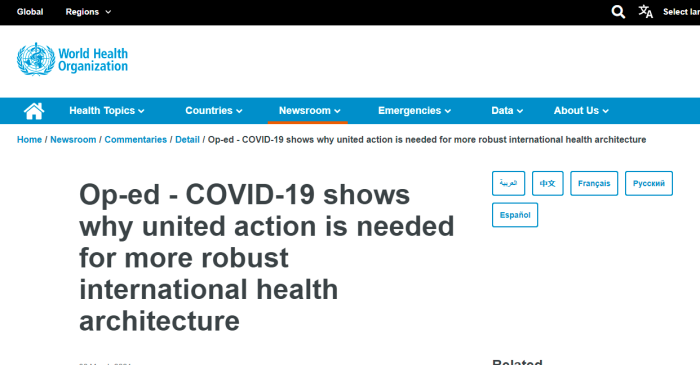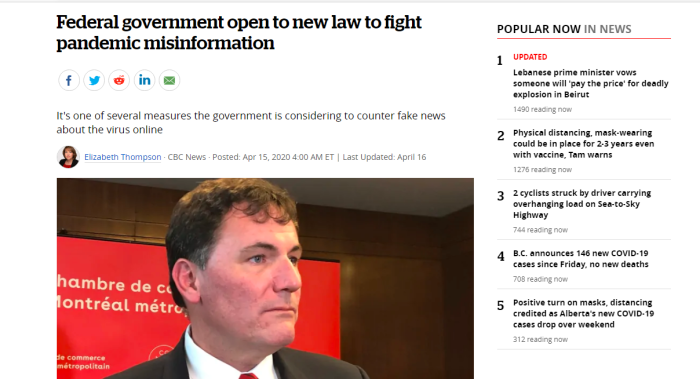
About 2 dozen world leaders have agreed, at least in principle, of setting up an international treaty to “deal with future pandemics”. Presumably, this would ultimately result in a World Government of sorts that could act in sweeping ways. But of course, it would all be done in the name of public health.
1. Important Links
https://www.who.int/news-room/commentaries/detail/op-ed—covid-19-shows-why-united-action-is-needed-for-more-robust-international-health-architecture
https://archive.is/pMWzw
(62.1) WHO International Health Regulations Legally Binding
(62.2) A Look At International Health Regulation Statements
(62.3) Quarantine Act Actually Written By WHO, IHR Changes
(62.4) Prov. Health Acts, Domestic Implementation Of WHO-IHR
(62.5) Prov. Health Acts, Domestic Implementation Of WHO-IHR, Part II
2. Text Of Letter Agreed By National Leaders
The COVID-19 pandemic is the biggest challenge to the global community since the 1940s. At that time, following the devastation of two world wars, political leaders came together to forge the multilateral system. The aims were clear: to bring countries together, to dispel the temptations of isolationism and nationalism, and to address the challenges that could only be achieved together in the spirit of solidarity and cooperation, namely peace, prosperity, health and security.
Today, we hold the same hope that as we fight to overcome the COVID-19 pandemic together, we can build a more robust international health architecture that will protect future generations. There will be other pandemics and other major health emergencies. No single government or multilateral agency can address this threat alone. The question is not if, but when. Together, we must be better prepared to predict, prevent, detect, assess and effectively respond to pandemics in a highly coordinated fashion. The COVID-19 pandemic has been a stark and painful reminder that nobody is safe until everyone is safe.
We are, therefore, committed to ensuring universal and equitable access to safe, efficacious and affordable vaccines, medicines and diagnostics for this and future pandemics. Immunization is a global public good and we will need to be able to develop, manufacture and deploy vaccines as quickly as possible.
This is why the Access to COVID-19 Tools Accelerator (ACT-A) was set up in order to promote equal access to tests, treatments and vaccines and support health systems across the globe. ACT-A has delivered on many aspects but equitable access is not achieved yet. There is more we can do to promote global access.
To that end, we believe that nations should work together towards a new international treaty for pandemic preparedness and response.
Such a renewed collective commitment would be a milestone in stepping up pandemic preparedness at the highest political level. It would be rooted in the constitution of the World Health Organization, drawing in other relevant organizations key to this endeavour, in support of the principle of health for all. Existing global health instruments, especially the International Health Regulations, would underpin such a treaty, ensuring a firm and tested foundation on which we can build and improve.
The main goal of this treaty would be to foster an all-of-government and all-of-society approach, strengthening national, regional and global capacities and resilience to future pandemics. This includes greatly enhancing international cooperation to improve, for example, alert systems, data-sharing, research, and local, regional and global production and distribution of medical and public health counter measures, such as vaccines, medicines, diagnostics and personal protective equipment.
It would also include recognition of a “One Health” approach that connects the health of humans, animals and our planet. And such a treaty should lead to more mutual accountability and shared responsibility, transparency and cooperation within the international system and with its rules and norms.
To achieve this, we will work with Heads of State and governments globally and all stakeholders, including civil society and the private sector. We are convinced that it is our responsibility, as leaders of nations and international institutions, to ensure that the world learns the lessons of the COVID-19 pandemic.
At a time when COVID-19 has exploited our weaknesses and divisions, we must seize this opportunity and come together as a global community for peaceful cooperation that extends beyond this crisis. Building our capacities and systems to do this will take time and require a sustained political, financial and societal commitment over many years.
Our solidarity in ensuring that the world is better prepared will be our legacy that protects our children and grandchildren and minimizes the impact of future pandemics on our economies and our societies.
Pandemic preparedness needs global leadership for a global health system fit for this millennium. To make this commitment a reality, we must be guided by solidarity, fairness, transparency, inclusiveness and equity.
Still think those “International Health Regulations” aren’t legally binding? Wrong, they will be used as the basis for asserting even more control. And it’s already largely done.
From the way things are going, it seems extremely unlikely that there will be any sort of referendum or democratic mandate to legitimize such a thing nationally.
When they say “coming together globally”, what does that really mean? Will there be a supra-national group to decide what sectors of the economy should be shut down? Will there be misinformation laws to punish or charge people for contradicting the narrative? Will they decide on mandatory vaccinations, or masks? What accountability, if any, will be in place?
3. Who Has Approved, At Least In Principle
- Edi Rama, Prime Minister of Albania;
- Sebastián Piñera, President of Chile;
- Carlos Alvarado Quesada, President of Costa Rica;
- J. V. Bainimarama, Prime Minister of Fiji;
- Emmanuel Macron, President of France;
- Angela Merkel, Chancellor of Germany;
- Charles Michel, President of the European Council;
- Kyriakos Mitsotakis, Prime Minister of Greece;
- Joko Widodo, President of Indonesia;
- Uhuru Kenyatta, President of Kenya;
- Moon Jae-in, President of the Republic of Korea;
- Mark Rutte, Prime Minister of the Netherlands;
- Erna Solberg, Prime Miniser of Norway;
- António Luís Santos da Costa, Prime Minister of Portugal;
- Klaus Iohannis, President of Romania;
- Paul Kagame, President of Rwanda;
- Macky Sall, President of Senegal;
- Aleksandar Vučić, President of Serbia;
- Cyril Ramaphosa, President of South Africa;
- Pedro Sánchez, Prime Minister of Spain;
- Prayut Chan-o-cha, Prime Minister of Thailand;
- Keith Rowley, Prime Minister of Trinidad and Tobago;
- Kais Saied, President of Tunisia;
- Volodymyr Zelensky, President of Ukraine;
- Boris Johnson, Prime Minister of the United Kingdom;
- Dr Tedros Adhanom Ghebreyesus, Director-General of the World Health Organization.

Sure, Canada isn’t on that list — yet. However, there is certainly nothing to indicate that we won’t be forced to go along at some point. The people running this country aren’t exactly huge supporters of free speech.

When was this written? Many of the countries listed above have already cancelled Covid restrictions. The following countries have either ended or announced the lifting of Covid restrictions (Oct. 2021):
Norway, Costa Rica, Mexico, Columbia, Dominican Republic, Albania, United Kingdom, Denmark, Portugal, Ireland, Thailand, Sweden, Japan, Iceland, and Russia. Singapore will not pressure citizens, and no proof of shots is necessary. Even Australia is changing and giving up on jabbing the protesters who are 50% of the population. New South Wales has lifted all Covid restrictions.
March 2021